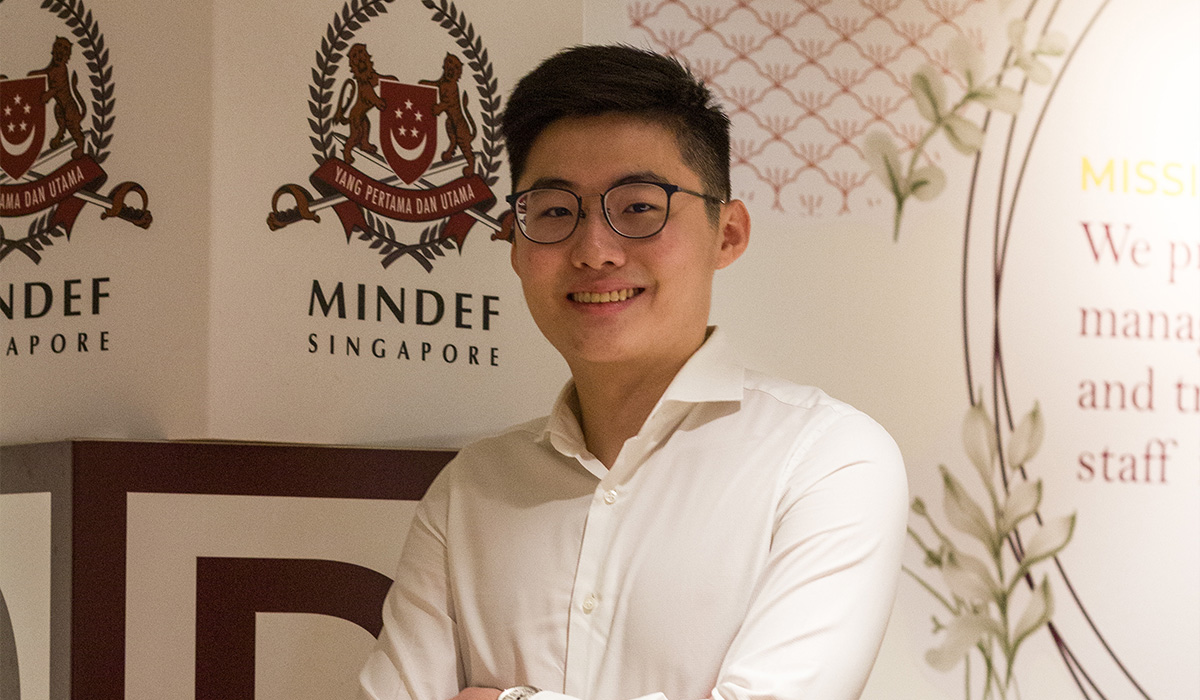Ong Jun Jie was awarded the Defence Merit Scholarship in 2014, under which he read a Bachelor of Science in Mathematics and Economics at the London School of Economics and Political Science and a Master of Business Analytics at Massachusetts Institute of Technology. He is currently a Manager in the Manpower Planning and Policy Division of MINDEF.
The backbone of the Singapore Armed Forces (SAF) are its people. No amount of sophisticated weaponry or technology would be of any use in an engagement without skilled and patriotic defence personnel.
This is where Ong Jun Jie shines. As a Manager in the Manpower Planning and Policy Division in the Ministry of Defence (MINDEF), his role requires great insight, communication skills, and professionalism as he looks at not just what someone is capable of now, but how to best groom them to their maximum potential in the future.
On that topic, Jun Jie was happy to introduce us to the Defence Merit Scholarship. The subject is near and dear to him, as he was awarded the scholarship in 2014. Now, he focuses on encouraging others to join him as Defence Executive Officers (DXOs) in civilian roles shaping defence policy, overseeing the budget or taking part in his own line, manpower management.
With that in mind, he spoke with us about his journey with MINDEF and the distinctive reward of a career in service.
To start with, what drew you to serving in MINDEF? Any sources of inspiration?
I have always been inspired by how Singapore managed to defy the odds of a small state with no natural resources to become the successful metropolis it is today. If we were to narrow down to one key reason for our survival and prosperity, I believe it would unequivocally be a strong defence.
Having a strong SAF gives credence to everything we do in Singapore, whether it is social activities or economic functions, it paves the way for many of the conveniences that we treasure every day. Hence, securing Singapore’s defence is first and foremost.
We understand you were awarded the Defence Merit Scholarship (DMS). As there are many SAF Scholarships, could you tell us about this one in particular?
Certainly! The DMS is a prestigious scholarship offered by MINDEF for civilian appointments in the organisation. The scholarship allows one to delve into the realm of defence and security sector,yet remain open to a wide range of multi-faceted roles and domains. For me, it offered options to explore breadth and depth across MINDEF, akin to a mini civil service.
I was also drawn in by the scope of the work at MINDEF, where I would be able to be at the forefront of shaping defence policies alongside military counterparts in the SAF. Gaining perspectives from both the non-uniformed and uniformed services puts me in a good position to see issues in a more holistic manner.
Speaking of a holistic outlook, we understand you have your educational background to thank for that as well. Could you tell us about your studies?
I studied my Bachelor’s in Mathematics and Economics at the London School of Economics and Political Science (LSE) and later took up a Master’s in Business Analytics at Massachusetts Institute of Technology (MIT). Both degrees allowed me to appreciate logic reasoning and learn technical skillsets such as coding and analytics.
A career in MINDEF allows you to experience many different roles throughout your careers. I see my academic background as a plus and value-add, especially as we are moving to digitalise the Public Service and adopt more data-driven approaches. Day-to-day, I would be applying the relevant concepts in my work, including the technical aspects.
Now let’s move on to your role and responsibilities. What kind of work does your role entail?
My first stint was in Defence Policy Office. I had the opportunity to contribute to Singapore’s defence diplomacy, through formulating forward-thinking and long-term strategies for the security architecture as well as securing our interest in cyber norms in regional and international fora.
Now, I am working at the Manpower Policy Department, with a focus on personnel development. In line with the national effort to move away from mere qualifications towards competencies, I look at how our people can upskill, reskill as well as broaden and deepen expertise throughout their career with MINDEF and beyond. Part of my work also involves developing strategies for workforce transformation and how we should view the future of work and digitalisation. My analytics background enables me to formulate data-driven solutions for our manpower issues, which take into account both business and technical requirements.
What do you hope to achieve in your career? What are your career goals and aspirations?
I hope to be part of something greater than myself, and to learn and contribute in ways that would bring meaning to our people and country. I hope to be able to look back and say that I have contributed to the nation, as much, if not more, than what it has provided for me.
We wish you every success! Lastly, what would you say to recommend MINDEF as a career choice for a fresh graduate?
Work at MINDEF is meaningful, and fulfillment for me comes from working with stakeholders to push through a particular policy initiative and seeing that everyone’s effort had culminated in mission success.
I value the supportive and nurturing environment in MINDEF. I appreciate that everyone in MINDEF believes in a common goal, and the camaraderie of “do good, do together”. I am thankful for the trust that management, supervisors and colleagues have vested in all of us, to take charge and ownership of projects and deliverables.
What we have is our people, and our people shape what we will have.


